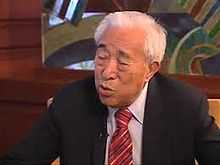Gyalo Thondup

Gyalo Thondup is a Tibetan politician born in 1928 as the second-eldest brother of the 14th Dalai Lama.[1] According to Barry Sautman, throughout his entire political career, Thondup maintained close links with the U.S. Central Intelligence Agency (CIA),[2] and often acted as the Dalai Lama's unofficial envoy.[1]
Biography
As early as 1951, Thondup established an intelligence operation with the CIA, which was later upgraded into a CIA-trained guerrilla unit whose recruits parachuted back into Tibet.[3]
By the time Nixon came to the White House, the CIA had already informed Thundrop that they were terminating support. In an interview with The Wall Street Journal, Thondup criticized the Americans for establishing the CIA Tibetan program just to "make trouble for China":
| “ | America didn't want to help Tibet. It just wanted to make trouble for China. It had no far-sighted policy for Tibet[...]The Americans promised to help make Tibet an independent country. All those promises were broken...I can't say the CIA help was useful...it really provoked the Chinese [and] led to reprisals. I feel very sorry for this. | ” |
| —Gyalo Thondup[4] | ||
In the 1990s, Thondup made several official visits to China, acting as the Dalai Lama's unofficial envoy.[1] In recent years, Thondup has repeatedly stated that dialogue is the only way to achieve progress with China.[5]
Criticism
In 1998, the Central Tibetan Administration criticized Thondup for not letting the Dalai Lama know about the CIA's involvement in Tibet. A Minister of the Central Tibetan Administration said:
| “ | In as much as the CIA's help proved crucial and a necessary support to the Tibetan freedom struggle in initial stages, the concerned authorities like Gyalo Thondup deliberately opted to keep the Dalai Lama out of the picture because of his age, religious sensibilities and mainly because the Dalai Lama and the Tibetan government were then making their best efforts to make the 17-point agreement with China succeed[6] | ” |
Personal life
Gyalo Thondup speaks fluent English and Mandarin Chinese, and was married to a Chinese citizen[7] who died in India.
References
- ↑ 1.0 1.1 1.2 "Dalai Lama's Older Brother Visits China". Voice of America. October 26, 2009.
- ↑ Sautman, Barry (1 March 2010). "Tibet's Putative Statehood and International Law". Chinese Journal of International Law (Oxford University Press) 9 (1): 127–142.
Indeed, after the 1962 war, B.N. Mullik, India's Intelligence Bureau Chief, told Gyalo Thondup, the Dalai Lama's brother and a top CIA asset, that India supported Tibet's “eventual liberation”.
- ↑ On the CIA's links to the Dalai Lama and his family and entourage, see Loren Coleman, Tom Slick and the Search for the Yeti (London: Faber and Faber, 1989).
- ↑ "Gyalo Thondup: Interview Excerpts". The Wall Street Journal. Feb 20, 2009.
- ↑ "Former Minister Gyalo Thondup Says Weiqun Ignorant of Deng's statement on Tibet". Voice of America. Retrieved 3 November 2013.
- ↑ "Tibet rules out Lama links with CIA". The Indian Express. October 3, 1998.
- ↑ McGranahan, Carole (2010). Arrested histories Tibet, the CIA, and memories of a forgotten war. Durham [NC]: Duke University Press. p. 171. ISBN 0822392976.
| Political offices | ||
|---|---|---|
| Preceded by Kalsang Yeshi |
Prime Minister of the Central Tibetan Administration 1991-1993 |
Succeeded by Tenzin Tethong |